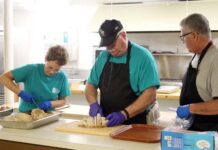By SYDNEY KENT
The mother of Owen Collins, a three-year-old from Wells County who died in January 2015, will be released from prison early.
Breanna Joy Arnold, 30, Bluffton, appeared in the Wells Circuit Court in September for a sentence modification hearing.
With the completion of “every possible program” thus far, Arnold already received a time cut of nearly seven years and was scheduled for release in July of 2028. In January, Arnold’s sentence was modified to 16 years executed with 6.5 years suspended. Her new release date is July 2025.
Arnold was originally sentenced in January 2017 to 22.5 years in prison for one count of dealing in methamphetamine in the presence of a child, a Level 2 felony. Of that, 2.5 years were suspended and ordered to be served on house arrest after she had served 75% of her sentence.
Multiple charges, including a Level 1 felony for neglect of a dependent resulting in death, were dismissed as part of her plea agreement, which capped her sentence at 20 years executed.
The charges were filed following the investigation into the Collins’ death.
According to a probable cause affidavit, police located the child’s body wrapped in plastic wrap in a charred dresser in the woods after he was initially reported missing. The scene was approximately 12 miles from his home. While authorities initially were told Collins had died after ingesting meth, his cause of death was later determined to be blunt force trauma.
Arnold’s then-boyfriend, Zachary Barnes, pled guilty to Collins’ murder and was sentenced to 50 years in prison. Barnes also pled guilty to abuse of a corpse and dealing methamphetamine. He was sentenced to 12 years behind bars.
During Arnold’s sentence modification hearing, multiple testimonies presented, including Arnold’s, depicted the lifelong suffering of a young victim who was abused by their stepfather — however, the victim was not Collins.
Arnold testified a thorough account of the physical, psychological and sexual abuse she endured and witnessed throughout her childhood.
Arnold said she experienced such severe sexual abuse as a child that she currently suffers from an ongoing medical condition that prohibits her from using the restroom without assistance. She cried as she said that medical care for her condition is limited in prison.
Arnold was represented by Mark Koselke, deputy attorney for the Indiana State Public Defender’s Office. Hannah Hall, Mitigation Investigation Specialist, also testified during the hearing.
Hall told the court that based on a self-administered quiz called the ACE questionnaire, Arnold has experienced more adverse childhood experiences than many of her peers. Hall emphasized that only 1 in 1,000 people experience the same amount or types of traumatic experiences.
Koselke said his office deals with the “worst of the worst” cases and that Arnold was exceptional.
“Breanna’s childhood was not only difficult, it was almost impossible to successfully come out of,” Koselke said. “She struggles to forgive herself.”
A close family member of Arnold also testified during the hearing. She recounted her experiences of the abuse that she and Arnold experienced at the hands of Carter Arnold and their two older brothers. The family member also told the court that her child was Carter Arnold’s most recent victim of child sexual abuse.
Koselke then asked the court to acknowledge that Carter Arnold had a current criminal case with said child.
Koselke argued that during Breanna Arnold’s original sentencing hearing, there was a “mischaracterization of the facts” and of Breanna Arnold as a person. This was largely in part because Carter Arnold was painted as a supportive figure in her life, Koselke said.
Koselke argued that the image of Breanna Arnold having a stable stepfather discounted her resilience during her original sentencing hearing.
He also said that Arnold admitted what she did was wrong and took full accountability for her crime.
Koselke detailed the long list of counseling services and programs Arnold has completed during her time in prison. He argued that it would be “cruel and unusual punishment’ to allow her to continue to remain incarcerated with no way to better herself and that she could access better services outside of prison.
“I’m good right now,” Arnold said regarding mental health services. “But I could be great.”
During her recount of the events that led up to Collins’ death, Arnold continually emphasized the word “his” concerning Barnes’ drug manufacturing and use. She also insisted she was forced to inject the drugs into her body. Prosecutor Colin Andrews also asked Arnold to explain a series of five counts of misconduct that occurred during her time in prison.
In one count, she walked away from prison officials, disobeying direct orders. She said that she felt she was doing what was best. Andrews argued that she was not more cooperative towards law enforcement according to the instance.
“I get the sense that Miss Arnold wants to be a genuine participant here,” Prosecutor Colin Andrews said. “There’s still a lot of finger-pointing and blame going on.”
Andrews acknowledged Arnold’s significant past with abuse, as well as the progress she has made over the last nine years. However, he argued that she failed to take full accountability for her part in Collins’ death. He also emphasized the response from the community and that the original sentence was “constitutionally appropriate” and should not be modified.
“There was a massive search that spanned multiple counties,” Andrews argued. “There is a cry for justice here for our community — we suffered for this. There are still stickers on our cars that say ‘fly home little buddy’ in honor of Owen.”
Kiracofe asked Arnold if she intended to return to this community. She confirmed.
“Undoubtedly you’re going to cross paths with someone who remembers and knows who you are,” Kiracofe said. “What would you say to them if you faced some criticism on why you’re out?”
“The fact of the matter is I’ve done two-thirds of my time and I’ve changed for the better,” Arnold responded. “If you grant this request from me, then that means you believe I can do better. If you grant this request, what does anyone have to say? I’ve done my time.”
Arnold said that her past is her past, and though she could move and start over in a new town, someone could always learn her identity. She said she wants to help other people in the future with her experiences and even open a facility to care for elderly offenders “in the proper way” one day.
Kiracofe said he would take the request under advisement and commended Arnold on her growth over the last near-decade.
In a letter to the court three months after the modification hearing, Arnold detailed additional employment opportunities she has received while in prison. Several weeks later in January, an order officially approved the modification.
During her closing statements, Arnold said that the first thing she wants to do when she gets released from prison is to visit Collins’ gravesite. Next, she wants to have a meal with her family
“It’s not easy to forgive yourself when it was my job to protect my children and do better for them,” Arnold said. “I know I need to tell my son, Travis, I’m sorry, but the person I need to say sorry the most is Owen, and I’m not going to get that opportunity unless I live my life right and end up in heaven with him. I have tried to change myself so going forward, I can do better. I want to live a better life and I don’t want to succumb to the circumstances of how I grew up.”
Carter Arnold was woven as the common thread that led to the unraveling of Arnold and Owen’s lives. Under the 18 Level 1 and Level 4 felonies for child molestation, Carter Arnold easily faced life in prison.
He was sentenced to a combined 16 years in prison under two charges for child molestation in October. Sixteen additional charges for child molesting were dismissed.
Kiracofe stated that Carter Arnold’s age was the only reason he was accepting the plea deal.
“I think your actions are disgusting,” Kiracofe said during his sentencing hearing in October. “Generational victimization has gone on.”
Arnold will be required to complete a period of probation following her release from incarceration.
sydney@news-banner.com



